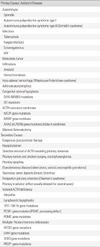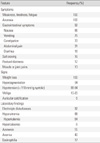Abstract
Adrenal insufficiency is caused by either primary adrenal failure or by hypothalamic-pituitary impairment of the corticotropic axis which is predominantly due to long-term glucocorticoid treatment or by pituitary disease. Primary adrenal failure is a rare disease that is life-threatening when overlooked whle adrenal failure secondary to hypothalamo-pituitary disease is a common clinical problem that has serious impact on the quality of life. Recent data suggests that the health-related quality of life in many patients with adrenal insufficiency is more severely impaired than previously thought and that current hormone replacement strategies are insufficient to prevent increased morbidity and mortality due to the disease. Therefore, the optimization and careful monitoring of glucocorticoid and mineralocorticoid replacement therapy remains one of the most challenging tasks in endocrinology. Leaving treatment aside, diagnosis of adrenal insufficiency is also challenging, because the main presenting symptoms such as fatigue, anorexia, and weight loss are non-specifically associated with many other common ailments, delaying a correct diagnosis. Some pitfalls in diagnostic work-up, particularly in the identification of secondary adrenal insufficiency, make the diagnosis even more difficult. Despite the difficulties, the complications associated with adrenal insufficiency make the rapid diagnosis and proper management of adrenal failure are important tasks for all physicians. We review here current standards for clinical assessment, diagnosis and treatment of adrenal insufficiency in light of recent research findings.
References
3. Stewart PM, Krone NP. Melmed S, Polonsky KS, Larsen PR, Kronenberg HM, editors. The adrenal cortex. Williams textbook of endocrinology. 2011. 12th ed. Philadelphia: Elsevier;479–544.

4. Willis AC, Vince FP. The prevalence of Addison's disease in Coventry, UK. Postgrad Med J. 1997. 73:286–288.

5. Nerup J. Addison's disease--clinical studies. A report fo 108 cases. Acta Endocrinol (Copenh). 1974. 76:127–141.
6. Laureti S, Vecchi L, Santeusanio F, Falorni A. Is the prevalence of Addison's disease underestimated? J Clin Endocrinol Metab. 1999. 84:1762.

7. Stewart PM, Corrie J, Seckl JR, Edwards CR, Padfield PL. A rational approach for assessing the hypothalamo-pituitary-adrenal axis. Lancet. 1988. 1:1208–1210.

8. Grinspoon SK, Biller BM. Clinical review 62: Laboratory assessment of adrenal insufficiency. J Clin Endocrinol Metab. 1994. 79:923–931.

9. Bornstein SR, Breidert M, Ehrhart-Bornstein M, Kloos B, Scherbaum WA. Plasma catecholamines in patients with Addison's disease. Clin Endocrinol (Oxf). 1995. 42:215–218.

10. Dorin RI, Qualls CR, Crapo LM. Diagnosis of adrenal insufficiency. Ann Intern Med. 2003. 139:194–204.

11. Fleisher MR, Glass D, Bitensky L, Chayen J, Daly JR. Plasma corticotrophin levels during insulin-hypoglycaemia: comparison of radioimmunoassay and cytochemical bioassay. Clin Endocrinol (Oxf). 1974. 3:203–208.

12. Oelkers W, Diederich S, Bahr V. Diagnosis and therapy surveillance in Addison's disease: rapid adrenocorticotropin (ACTH) test and measurement of plasma ACTH, renin activity, and aldosterone. J Clin Endocrinol Metab. 1992. 75:259–264.

13. Tordjman K, Jaffe A, Grazas N, Apter C, Stern N. The role of the low dose (1 microgram) adrenocorticotropin test in the evaluation of patients with pituitary diseases. J Clin Endocrinol Metab. 1995. 80:1301–1305.

14. Kazlauskaite R, Evans AT, Villabona CV, Abdu TA, Ambrosi B, Atkinson AB, et al. Corticotropin tests for hypothalamic-pituitary- adrenal insufficiency: a metaanalysis. J Clin Endocrinol Metab. 2008. 93:4245–4253.

15. Hamilton DD, Cotton BA. Cosyntropin as a diagnostic agent in the screening of patients for adrenocortical insufficiency. Clin Pharmacol. 2010. 2:77–82.
16. Fiad TM, Kirby JM, Cunningham SK, McKenna TJ. The overnight single-dose metyrapone test is a simple and reliable index of the hypothalamic-pituitary-adrenal axis. Clin Endocrinol (Oxf). 1994. 40:603–609.

17. Lindholm J. The insulin hypoglycaemia test for the assessment of the hypothalamic--pituitary--adrenal function. Clin Endocrinol (Oxf). 2001. 54:283–286.

18. Inder WJ, Hunt PJ. Glucocorticoid replacement in pituitary surgery: guidelines for perioperative assessment and management. J Clin Endocrinol Metab. 2002. 87:2745–2750.

19. Axelrod L. Jameson JL, De Groot LJ, editors. Glucocorticoid therapy. Endocrinology. 2010. 6th ed. Philadelphia: Elsevier;1839–1852.

20. Coursin DB, Wood KE. Corticosteroid supplementation for adrenal insufficiency. JAMA. 2002. 287:236–240.

21. Hahner S, Allolio B. Therapeutic management of adrenal insufficiency. Best Pract Res Clin Endocrinol Metab. 2009. 23:167–179.

22. Cameron DR, Braunstein GD. The use of dehydroepiandrosterone therapy in clinical practice. Treat Endocrinol. 2005. 4:95–114.

23. Alkatib AA, Cosma M, Elamin MB, Erickson D, Swiglo BA, Erwin PJ, et al. A systematic review and meta-analysis of randomized placebo-controlled trials of DHEA treatment effects on quality of life in women with adrenal insufficiency. J Clin Endocrinol Metab. 2009. 94:3676–3681.

24. Weise M, Drinkard B, Mehlinger SL, Holzer SM, Eisenhofer G, Charmandari E, et al. Stress dose of hydrocortisone is not beneficial in patients with classic congenital adrenal hyperplasia undergoing short-term, high-intensity exercise. J Clin Endocrinol Metab. 2004. 89:3679–3684.

25. White K, Arlt W. Adrenal crisis in treated Addison's disease: a predictable but under-managed event. Eur J Endocrinol. 2010. 162:115–120.

26. Cooper MS, Stewart PM. Corticosteroid insufficiency in acutely ill patients. N Engl J Med. 2003. 348:727–734.

27. Loriaux DL, Fleseriu M. Relative adrenal insufficiency. Curr Opin Endocrinol Diabetes Obes. 2009. 16:392–400.

28. Asare K. Diagnosis and treatment of adrenal insufficiency in the critically ill patient. Pharmacotherapy. 2007. 27:1512–1528.

29. Crown A, Lightman S. Why is the management of glucocorticoid deficiency still controversial: a review of the literature. Clin Endocrinol (Oxf). 2005. 63:483–492.

30. Lindsay JR, Nieman LK. The hypothalamic-pituitary-adrenal axis in pregnancy: challenges in disease detection and treatment. Endocr Rev. 2005. 26:775–799.

31. Bjornsdottir S, Cnattingius S, Brandt L, Nordenstrom A, Ekbom A, Kampe O, et al. Addison's disease in women is a risk factor for an adverse pregnancy outcome. J Clin Endocrinol Metab. 2010. 95:5249–5257.

32. Rizzoli R, Adachi JD, Cooper C, Dere W, Devogelaer JP, Diez-Perez A, et al. Management of glucocorticoid-induced osteoporosis. Calcif Tissue Int. 2012. 91:225–243.

33. Weinstein RS. Glucocorticoid-induced osteoporosis and osteonecrosis. Endocrinol Metab Clin North Am. 2012. 41:595–611.

34. Teitelbaum SL. Bone: the conundrum of glucocorticoid-induced osteoporosis. Nat Rev Endocrinol. 2012. 8:451–452.

35. Thomas T, Horlait S, Ringe JD, Abelson A, Gold DT, Atlan P, et al. Oral bisphosphonates reduce the risk of clinical fractures in glucocorticoid-induced osteoporosis in clinical practice. Osteoporos Int. 2012. Forthcoming.

36. Dullaart RP, Schols JL, van der Steege G, Zelissen PM, Sluiter WJ, van Beek AP. Glucocorticoid replacement is associated with hypertriglyceridaemia, elevated glucose and higher non-HDL cholesterol and may diminish the association of HDL cholesterol with the -629C>A CETP promoter polymorphism in GH-receiving hypopituitary patients. Clin Endocrinol (Oxf). 2008. 69:359–366.

37. Filipsson H, Monson JP, Koltowska-Haggstrom M, Mattsson A, Johannsson G. The impact of glucocorticoid replacement regimens on metabolic outcome and comorbidity in hypopituitary patients. J Clin Endocrinol Metab. 2006. 91:3954–3961.

38. Suliman AM, Freaney R, Smith TP, McBrinn Y, Murray B, McKenna TJ. The impact of different glucocorticoid replacement schedules on bone turnover and insulin sensitivity in patients with adrenal insufficiency. Clin Endocrinol (Oxf). 2003. 59:380–387.

39. Maisey DN, Brown RC, Day JL. Letter: rifampicin and cortisone replacement therapy. Lancet. 1974. 2:896–897.
40. Kyriazopoulou V, Parparousi O, Vagenakis AG. Rifampicin-induced adrenal crisis in addisonian patients receiving corticosteroid replacement therapy. J Clin Endocrinol Metab. 1984. 59:1204–1206.

41. Bornstein SR. Predisposing factors for adrenal insufficiency. N Engl J Med. 2009. 360:2328–2339.

42. Robinson BG, Hales IB, Henniker AJ, Ho K, Luttrell BM, Smee IR, et al. The effect of o,p’-DDD on adrenal steroid replacement therapy requirements. Clin Endocrinol (Oxf). 1987. 27:437–444.

43. Mah PM, Jenkins RC, Rostami-Hodjegan A, Newell-Price J, Doane A, Ibbotson V, et al. Weight-related dosing, timing and monitoring hydrocortisone replacement therapy in patients with adrenal insufficiency. Clin Endocrinol (Oxf). 2004. 61:367–375.




 PDF
PDF ePub
ePub Citation
Citation Print
Print






 XML Download
XML Download